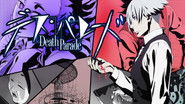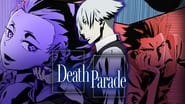youssefsiher
I'm not joking. This anime is something special that will always stay with me. Death is not a simple matter that can be discussed. It's something more. So is life and its meaning. I cried for at least 2 episodes. No other anime, movie or TV show made me feel all those feelings. The dialogues are not void and meaningless. They center the target of the story, and everything is connected till the end. I am very happy that, in the anime, love is the only feeling that can change everything, and that can overcome even fear. I spent a delightful time watching it, and I'm very happy. I recommend you to do so! You'll thank me later.
bmoore07
When people pass away on Earth, they are immediately transported to a place called Quindecim, a fancy 90-floor hotel that serves as a waiting place between Heaven and Hell. At Quindecim, to determine where their destination is, the people have to play a game, ranging from Twister to bowling and even Old Maid, and throughout the game, they receive memories of they died and crucial moments from their lives. Overseeing the games are human-like beings known as 'arbiters' and Decim, the main character of Death Parade is one of them. A pale, white-haired bartender, Decim is cordial, courteous, and considerate, but to describe him as warm-hearted would be a huge mistake. The other main character is a woman with black hair and red eyes who doesn't remember her real name (It's revealed later in the series) so is called "Onna". Onna serves as Decim's assistant, providing new insight in tough situations while pointing out the flaws in the arbiter's system. Throughout the series, Onna helps Decim to realize there's a different way, a better method, of judging the deceased and, more importantly, to express his emotions, something entirely unprecedented for our super-serious young bartender. It's not obvious early on but, later in the series, Onna's acting dominates Death Parade, especially in episodes 9 and 12, and, in the end, she solidifies herself as this anime's most memorable character.Misaki, an actress that arrived at Quindecim in episode 4, once said, "Holy crap, this show must have a serious budget." Death Parade's amazing animation, something expected from a 2015 anime, inspires a reaction like Misaki's every time, and the soundtrack is easily one of the best I've ever heard. The series showcases the same couple of songs but its blend of soothing jazz and classical music always pleases me (Death Parade's greatest exhibition of musical excellence is in the unforgettable sequence in episode 11, where an ice skater and an extremely emotional piano piece glide across a vast ice rink in perfect harmony). One of my favorite things about Death Parade is its theme song, a fast-paced, synthesized-pop number containing lyrics that alternate between English and Japanese. For some shows, the opening is the highlight of the series, but for Death Parade, it's one more great aspect in an anime full of them.Quindecim is not only the home of our two main characters, Decim and Onna; it is the residence of tons of other characters as well. Nona is Decim's boss as well as the owner of the establishment, a demanding young woman requiring perfection from her subordinates, and a petite but powerful arbiter that induces fear and respect from the other characters. Quin is the brains behind the arbiter system, a likable information processing worker with an eye-patch and an unbridled love for alcohol. Clavis is my personal favorite, a relatively minor character with green hair, an easygoing demeanor, and a job as elevator operator. Ginti is the red-haired hothead with a sadistic side to his personality who serves as an intriguing counterpart to Decim's cool, calm, and collected appearance. Death Parade's supporting cast, while some don't receive as much detail as they should (*cough* Clavis *cough*), is overall a fairly fleshed- out crew of characters.I think every great series needs an equally great villain, but Death Parade is lacking in that department. In Paranoia Agent, Lil Slugger was a villain symbolic of society's struggles whose very existence was a mystery. In Black Cat, you loathed Creed Diskenth but his charm, his passion, and his uniqueness made him an interesting character to say the least. Death Parade's main antagonist (or the closest thing the series has to one) is an elderly arbiter named Oculus, the creator of the arbiter system with a strongly-held belief that arbiters don't have emotions (to him, they're but disposable dummies) and that humans are ultimately worthless. When Nona, who Oculus is technically superior to, rebels against his system and alters the rules of the arbiter, Oculus' answer to being undermined by his subordinate is not to kill Nona and anyone associated with her ideals, as any legitimate villain would've done, but to engage in a philosophical debate with Nona and to "keep an eye on her." This is an unfair comparison to make, but do you think Johan Liebert would've done the same thing if he were in Oculus' shoes? The Oculus issue, a run-of-the-mill first episode, and the fact that some of the stories of the deceased folks entering Quindecim didn't contain as much detail as I expected, are the reasons why I can't include Death Parade on any all-time-greats list. For what it's worth, I enjoyed watching this series (I especially loved the way Death Parade concluded the series) and, while it's not the best anime I've ever seen, Death Parade is a favorite and I'd say this is the greatest anime of the year.




